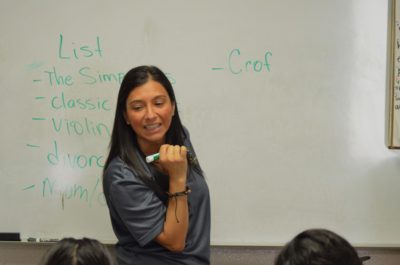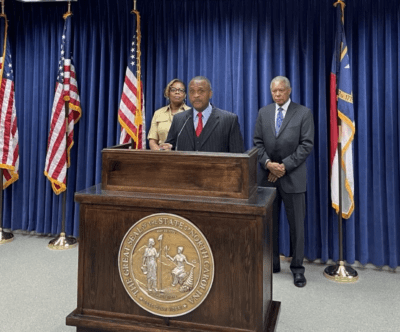
As a sixth-grade English teacher, I have always relied on novels and stories that expose my students to significant historical events and meaningful questions that foster and develop their self-efficacy and empathy. Choosing to teach Anne Frank’s diary has always fit nicely into those admittedly lofty goals.
However, after a few years of teaching Anne’s diary, I began to examine my teaching practices. As an English teacher, just how much history did I need to include in my unit on Anne and her story? And if I did include some history lessons, what was the most necessary? Did my sixth graders need to understand the political environment of Germany before Hitler’s rise? Surely not. But if not, then how would I explain antisemitism? Where then to begin?
For many students, Anne’s diary of her time in hiding during World War II is their first introduction to the Holocaust. Thus, getting the historical and religious contexts of her story correct is of the utmost importance and sets the stage for our students’ development of knowledge as they progress through middle and high school. I realized that being an English teacher was not an excuse for not properly teaching my students the historical and religious contexts of the Holocaust literature I was introducing them to.
Hard history pedagogy in schools
Teachers know that it is difficult to tackle hard history of any kind in the classroom. Julia Rose, a museum director and author of the book, “Interpreting Difficult History at Museums and Historic Sites,” writes that these “histories describe memories of pain, suffering, oppression, and grief that are emotive, thereby inciting anxiety, resistance, and stress for their audiences.”
Teaching about American slavery, forced removal of Native peoples from their lands, wars, and similar topics are inescapable. We teach these topics to help our students become better people, and to understand their world. Teachers know, however, that teaching these topics requires sensitivity and smart pedagogical choices.
Within this larger umbrella of pedagogical considerations for teaching hard history are the specific pedagogical concerns for teaching the Holocaust. The United States Holocaust Memorial Museum has a list of ten guidelines which should be common knowledge to any teacher planning and using lessons about the Holocaust for any subject area and grade level. For North Carolina teachers, we also have a treasure trove of resources here within our state.
The North Carolina Council on the Holocaust
In 2021, state legislators passed the bipartisan-supported Gizella Abramson Holocaust Education Act, requiring secondary schools within our state to teach students about the Holocaust. However, unlike many other states with similar legislation, North Carolina has truly supported this legislation by providing necessary funding for curriculum development and professional development for teachers searching for tools and lesson plans. Michael Abramson, the Chairman of the North Carolina Council on the Holocaust, and Gizella’s son, stated that the Holocaust Council has “worked tirelessly over the past two years to write an incredibly robust, gold standard curriculum for grades six through twelve for teachers to ensure that they are teaching accurately and with deep understanding.”
As teachers are currently looking forward to planning their 2024-25 school year curricula and considering where and when to include lessons about the Holocaust, a visit to the council’s website provides everything from complete units to opportunities for professional development, all of which are free for teacher use. Additionally, all of the curricula was vetted by historians at the United States Holocaust Memorial Museum, the state Department of Public Instruction, as well as classroom teachers and hundreds of North Carolina students to ensure high-quality lessons that meet state and national standards.
Curricular choices
Every grade level for the English curricula (6-12) offers a choice of two books, with multiple ideas for implementation. The writers of the English curricula wanted teachers to feel engaged and have the ability to choose the texts that would work best for their students.
For example, the sixth-grade curricula on the council’s website offers two complete units, one on “The Devil’s Arithmetic” and the second on “The Boy on the Wooden Box.” As students mature, the texts as well as the corresponding assignments and essential questions become more complex. The tenth grade curricula options are between Eli Wiesel’s “Night” and “Rena’s Promise,” while twelfth grade teachers are able to choose between “Babi Yar” and “The Sunflower.”
Similarly, the social studies curricula is structured to meet the intense demands of the state standards for grades six through 11, and teachers can choose to teach these either chronologically or thematically. Lee Holder, one of the social studies curricula team members explained their process: “we went through each course’s standards, objectives, and inquiry standards to identify where in the standard course of study the Holocaust and related topics could be taught.” Thus for each social studies course there are “multiple lesson ideas, readings, film clips, and research sites that teachers can refer to” as they teach the Holocaust in their classrooms.
Professional development
When I attended one of the council’s full-day workshops in October 2023, I was blown away by the choices and learning opportunities for the teachers in attendance. After a morning lecture from a historian with the US Holocaust Memorial Museum, the multiple breakout sessions spanned from learning about Nazi propaganda, understanding the history of antisemitism, utilizing timelines to support student engagement, and more.
In addition, these workshops typically feature a talk from a Holocaust survivor, of which the state of North Carolina is very blessed to have many. Perhaps most importantly though, all of the sessions placed a heavy emphasis on what teachers could do within their classrooms — starting tomorrow.
For twelfth grade Winston-Salem/Forsyth County Schools English teacher Jaela Marshall, the workshop she attended was invaluable.
“Having the opportunity to attend these kinds of conferences is an incredible opportunity to glimpse into our history and understand how the lessons learned can be applied to our daily lessons,” Marshall said. “We will not be able to always learn from these first-person accounts, so it’s important to take advantage while they’re available.”
As this school year comes to an end, I urge teachers to look ahead to their next school year. The council will offer multiple training days and workshops next school year, so please keep an eye on their website for dates. They also move the location of the workshops to better reach teachers in different parts of our state. Lastly, the council also generously pays for substitute coverage to districts of attending teachers to allow for maximum engagement and attendance. If you are a teacher who wants to learn more about the teaching of the Holocaust, these workshops are truly an invaluable experience.




